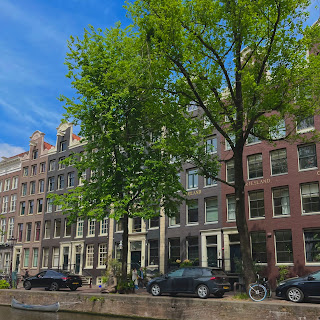Hello, for the last time!
Wow. Time flies. This post is written in a bittersweet tone as I have left the Netherlands. My views on practically everything have changed. This trip offered me valuable lessons I would likely never have learnt otherwise. For example, I will never use Deutsche Bahn transportation services for as long as I live.
Perhaps the most important changes from this trip are the ones from within. I used to be strongly anti sex work. I felt as though it was coercive and patriarchal. While this may be true in places like the United States, where sex work is illegal, this is not the case in the Netherlands. From our conversations with Lucy and Brenda, I saw the freedom of choice within the sex work industry that the United States lacks. These free choices are the result of a combination of things that ultimately stem from a place of pragmatism and general compassion (which the Dutch have tenfold compared to the U.S.). Most of the interactions I’ve had with sex workers in the United States are bleak-desparation masked by women’s empowerment. It seems that the main drive for sex workers in the U.S. is an avoidance of bankruptcy, whereas in the Netherlands, especially in Amsterdam, it is more of a choice. In a country where a medical emergency won’t bankrupt you, the ability to choose is much stronger. I’ve become an ardent defender of sex work legalization. These women are treated as entrepreneurs rather than as sob stories. This is evident in their requirement to register with the Chamber of Commerce and hold a valid passport every day they work (Majoor, 2015). Furthermore, condoms, lube, and part of the window workers' rent are tax-deductible.
Normalization of sex work and sex in general is a major tenet in Dutch culture. In parenting, children are seen as autonomous, almost like mini-adults. Their sexual activity and alcohol consumption are normalized in a safe and accepting way, which makes Dutch adolescents feel more comfortable as their bodies change during puberty (Schalet, 2004). Normalization is used in Dutch culture to ensure their comfort in their bodies. The United States often takes the opposite approach. Many parents demonize sexual activity and alcohol use. This is reflected in the sex education curriculum the United States has, which preaches abstinence above all else. This method is highly ineffective and accomplishes nothing. As stated in Ott and Santelli (2007), the United States has the highest adolescent birth rate in the Western world, with 42 births per 1,000 adolescents. In comparison, the Netherlands' adolescent birth rate is 5 births per 1,000 adolescents. This monumental gap is likely due to the education and access that Dutch adolescents receive in comparison to American adolescents. One of our class speakers, Dr. Linda Duits, says that birth control is free and accessible for Dutch teens who are 15 years or older. This kind of community support is what allows Dutch adolescents to explore their sexuality in a safe and caring environment-something the United States lacks.
Healthcare accessibility is truly what sets the Dutch miles (or kilometers) ahead of the United States in terms of overall quality of life. In a country where medical protections are never guaranteed, it’s hard to imagine having universal healthcare that covers gender affirming surgery. We had the opportunity to talk with a historian who focuses on transgender healthcare and accessibility. As a trans man himself, Alex Bakker could not fathom the United States’ healthcare and political systems. He said it reminded him of Berlin in the 1930s. This notion was quite terrifying to us, and as I prepare to reenter a country in shambles, it has become even more scary. Overall, the Dutch have an incredibly pragmatic approach to people in politics that has allowed them to thrive as one of the happiest countries in the world (World Population Review, 2024). I can only hope the United States adopts this same pragmatism, lest we fall into a situation that causes future historians to say “never again”.
With pragmatism,
Claire💌
(n = 684)
References
Majoor, M. (2015). When Sex Becomes Work (Chapter 3, pp. 20-30). Prostitution Information Center
Ott, M. & Santelli, J. (2007). Abstinence and abstinence-only education. Current Opinion in Obstetrics & Gynecology, 19(5), 446-452. https://doi.org/10.1097/GCO.0b013e3282efdc0b
Schalet, A. T. (2004). Must we fear adolescent sexuality? Medscape General Medicine, 6(4), 1-18.
World Population Review. (2024). Happiest Countries in the World 2024. World Population Review. https://worldpopulationreview.com/country-rankings/happiest-countries-in-the-world
"I have acted with honesty and integrity in producing this work and am unaware of anyone who has not."
-Claire Adams












